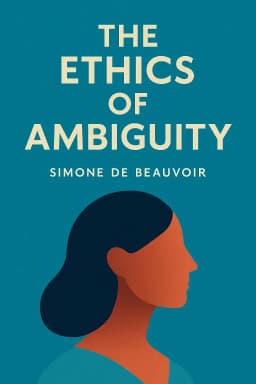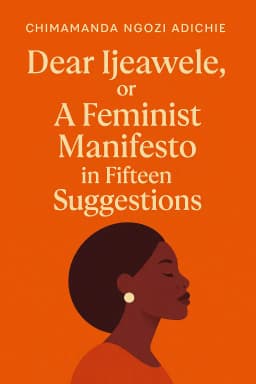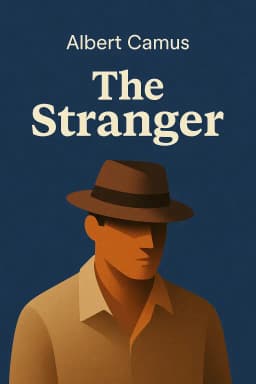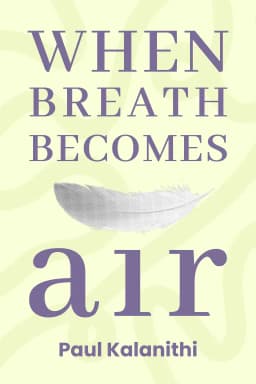
The Purpose of No Purpose
Golden Hook & Introduction
SECTION
Michael: You know all that advice about 'finding your purpose'? What if the most liberating thing you could do is accept you don't have one? That there is no grand plan, no cosmic job description for you. And that, paradoxically, is where true meaning begins. Kevin: That's a pretty radical starting point. It sounds both terrifying and freeing all at once. Like being told you can build anything you want, but you're handed an empty plot of land and no toolbox. Where is this coming from? Michael: It comes from one of the most foundational texts of existentialist philosophy, The Ethics of Ambiguity by Simone de Beauvoir. And the context is everything. She wrote this in 1947, just six months after giving a lecture on the topic. Imagine the world at that moment. Kevin: Right, the dust is literally still settling from World War II. The horrors of the Holocaust, the devastation of battles like Stalingrad... the world had seen the absolute extremes of human behavior. Michael: Exactly. And the big intellectual crisis was, 'If we can't rely on God or some universal moral law, what's to stop us from doing anything? What's the basis for any kind of ethics?' People were worried existentialism meant 'anything goes.' De Beauvoir’s book was a direct, powerful answer to that fear. She wasn't offering chaos; she was offering radical responsibility. Kevin: I’m intrigued. So if there's no divine rulebook, where does she even start building an ethics from scratch? What's the first brick she lays on that empty plot of land?
The Tragic Beauty of Ambiguity: Why Freedom is a Burden
SECTION
Michael: The first brick is the title of the book itself: Ambiguity. She argues that the fundamental, inescapable condition of being human is one of ambiguity. We are, at the same time, two completely different things. Kevin: Hold on, Michael. 'Ambiguity' sounds like a polite, academic word for 'confusion.' What does she actually mean by that? Is she just saying life is complicated? Michael: It's more profound than that. She says we are a paradox. On one hand, we are a physical object. We have a body, we exist in a specific time and place, we're subject to the laws of physics. She calls this our 'facticity.' We are a thing in the world, like a rock or a tree. Kevin: Okay, I'm with you so far. I am definitely a thing that needs coffee to function. Michael: But on the other hand, we are a consciousness. A mind. A subject that thinks, dreams, plans, and is aware of its own existence. We can look at our own 'facticity' and decide what to do about it. A rock can't decide to become a sculpture. We can. This freedom to transcend our situation is what makes us human. We are, as she quotes, a "thinking reed"—part of nature, but able to think beyond it. Kevin: So the ambiguity is that we're both a prisoner of our circumstances and totally free at the same time. We're a puppet that's also aware it's the puppeteer. That does sound like a recipe for a headache. Michael: It is! And de Beauvoir says most of us spend our lives desperately trying to escape this tension. And the most common escape route is what she calls the "spirit of seriousness." To explain it, she uses this brilliant, relatable story of childhood. Kevin: Oh, I like this. Let's hear it. Michael: Think about when you're a child. The world is a solid, stable, pre-made thing. Values are absolute. Good and bad are clearly defined by your parents, your teachers, the church. The rules are given to you. 'Don't lie.' 'Share your toys.' 'Respect your elders.' The world has an inherent meaning, and your job is just to learn it. Kevin: It's a very safe world. The values feel as real as the kitchen table. You don't question them. Michael: Exactly. It's a world without ambiguity. But then, adolescence hits. You start to see the cracks. You realize your parents are just people, making it up as they go along. You see that the rules are inconsistent, that authorities can be wrong, that values are not objective truths written into the fabric of the universe. They're human inventions. Kevin: That's the moment of crisis. The floor drops out from under you. You realize you have to decide for yourself what is right and wrong. It’s terrifying. Michael: That terror is the price of freedom. And de Beauvoir says many people never actually leave that childhood state. They become what she calls the "Serious Man." The Serious Man is an adult who simply swaps one set of ready-made values for another. Kevin: Let me see if I get this. So the Serious Man might reject his parents' religion, but then he devotes himself with the same blind faith to a political party, or a corporation's mission statement, or even an abstract ideal like 'The Revolution' or 'The Market.' Michael: You've nailed it. The content of the values doesn't matter. What matters is that the Serious Man treats them as absolute, external truths. He does this to escape the terrifying responsibility of admitting that he is the one choosing them. He's outsourcing his freedom to avoid the anxiety of it all. He's pretending he's still a child in a world of solid rules. Kevin: That is uncomfortably relatable. It’s the allure of the life script. Follow these steps—get this degree, this job, this house—and you'll be happy. It saves you from the hard work of figuring out what happiness even means to you. Michael: And de Beauvoir calls this an 'inauthentic' way to live. It's a flight from what it means to be human. To make this point even sharper, she brings up the unsettling example of Hermann Goering at the Nuremberg trials. Kevin: Whoa, that's a hard turn. How does a Nazi war criminal fit into this? Michael: It's a provocative point. She notes that a man like Goering, who committed monstrous acts, was at least choosing his values. He was actively creating a project, a horrific one, but it was his. He wasn't just passively following orders. She contrasts him with what she calls the "sub-man," the person who has no values of their own and just drifts along, attaching themselves to any powerful movement without thought. The Serious Man clings to an external idol; the sub-man doesn't even have that. He's just empty. Kevin: So she's not admiring Goering, obviously. She’s using him as an extreme example to show the difference between actively, if monstrously, using your freedom versus completely abdicating it. Michael: Precisely. It's a chilling way to illustrate that the failure to choose, the failure to engage with your own freedom, is its own kind of moral catastrophe. It creates a vacuum that evil can easily fill.
The Ethics of Liberation: Your Freedom Depends on Mine
SECTION
Kevin: Okay, so if we manage to avoid being the Serious Man or the sub-man, and we actually accept this heavy burden of freedom... what's next? Does that mean it's just a free-for-all? My chosen values versus your chosen values, and may the best person win? That sounds like a recipe for chaos. Michael: This is where de Beauvoir makes her most crucial and brilliant move. She says no, absolutely not. The very act of authentically choosing your own freedom immediately and logically commits you to choosing freedom for everyone else. Kevin: That sounds nice and idealistic, but I'm not sure I follow the logic. Why can't I just be free on my own little island, not bothering anyone? Why does my freedom depend on yours? Michael: Because freedom, for de Beauvoir, isn't an abstract idea in your head. It's a concrete thing. It's the ability to project yourself into the world, to have goals, and to act on them to change your reality. Freedom needs a future it can build. And you can only do that in a world with other free people. She gives a powerful example: "The Slave's Infantile Situation." Kevin: Tell me about it. Michael: A slave owner might think he is the ultimate free man. He has total power, he can do whatever he wants. But de Beauvoir argues his freedom is hollow, it's a lie. Why? Because his entire 'project' as a master depends on systematically denying the freedom and humanity of another person. He has to treat the slave as an object, a thing, to maintain his own status. Kevin: So his freedom is built on a foundation of oppression. It's not a genuine freedom because it actively works to eliminate freedom from the world. Michael: Exactly. He is trapped in his role as oppressor just as the slave is trapped as the oppressed. To truly will his own freedom, he would have to recognize the slave as another free consciousness, another subject. But if he did that, his entire world would collapse. He can't be a master without a slave. So his 'freedom' is a dead end. Kevin: That makes so much sense. It's not just about being nice to other people. It's that oppression is a contradiction. You can't claim to value freedom while actively destroying it in others. It poisons the well for everyone. Michael: And she gives another, even more subtle example that I think is just devastatingly brilliant. It's about the revolts in Italy in 1946. Kevin: What happened there? Michael: In post-war Italy, there was massive unemployment. So, the government created public works programs. But in some cases, the work was completely pointless. For example, they would pay men to use hammers to break large pebbles into small ones, and then the next day, other men would be paid to move the small pebbles back to another pile. There was no purpose to it. The pebbles weren't being used for roads or construction. It was just busy work. Kevin: That sounds soul-crushing. Like something out of a Greek myth. Michael: It was. And the workers revolted. They went on strike. And what's fascinating is that they weren't primarily demanding more pay or better hours. They were revolting because the work itself was an insult to their humanity. It denied them the very thing that makes us human: the ability to use our freedom to create something meaningful, to have a purpose, to project ourselves into the future. Kevin: Wow. So freedom isn't just the absence of chains. It's the presence of purpose. The ability to act meaningfully. Being forced to do something pointless is another form of oppression. It reduces you to an object, a machine performing a useless function. Michael: You've hit the very heart of it. That's why your freedom is tied to mine. If I live in a society that allows systems of oppression to exist—whether it's slavery, or systemic poverty, or even just the soul-crushing pointlessness of modern bureaucracy—I am living in a world where freedom is diminished. My own projects, my own ability to act freely, are ultimately constrained by a world that doesn't value freedom for all. To will myself free is to will a world where everyone is free to pursue meaningful goals.
Synthesis & Takeaways
SECTION
Michael: And that, right there, is the 'Ethics of Ambiguity.' It's not a neat list of dos and don'ts. It's a dynamic, challenging call to action. It starts with that terrifying, personal realization that we are alone in an indifferent universe, responsible for creating our own meaning. Kevin: But it doesn't end in that lonely, dark place. It doesn't lead to nihilism or selfishness. It leads, almost inevitably, to solidarity. Michael: Exactly. De Beauvoir turns that famous existentialist dread on its head. Dostoevsky worried, "If God does not exist, everything is permitted." De Beauvoir's response is, "Yes, everything is permitted... and therefore you are responsible for everything." There are no excuses. You can't blame God, or nature, or your boss. Your actions are yours alone, and they are what create the world. Kevin: So the ultimate ethical act isn't about personal purity or following a moral code perfectly. It's about fighting for a world where more people have the concrete ability to be free. It’s not about judging people's choices from on high, but about dismantling the systems—the economic, social, and political structures—that keep them in that 'infantile situation' de Beauvoir described, unable to make real choices at all. Michael: That's the entire project. She writes, "To will oneself moral and to will oneself free are one and the same decision." The two are inseparable. Every choice we make, every action we take, either contributes to a world of greater liberation or a world of greater oppression. It either opens up the future for others or closes it down. Kevin: It's a heavy responsibility, but it's also incredibly empowering. It means our lives, our small actions, have real stakes. They matter not just for us, but for everyone. Michael: That's the weight and the beauty of it. It replaces the comfort of a pre-made purpose with the profound meaning of a purpose you build yourself, alongside others. It leaves you with a powerful, unavoidable question to ask yourself every day. Kevin: What's that? Michael: Is my life, are my actions, creating more freedom for others? Or am I just living comfortably in my own 'world of seriousness,' pretending the walls of my life don't affect anyone else? Kevin: That’s a question that will stick with me. And we'd love to hear what our listeners think. Does this idea of freedom as a shared project resonate with you? Join the conversation on our social channels and let us know. Michael: This is Aibrary, signing off.









